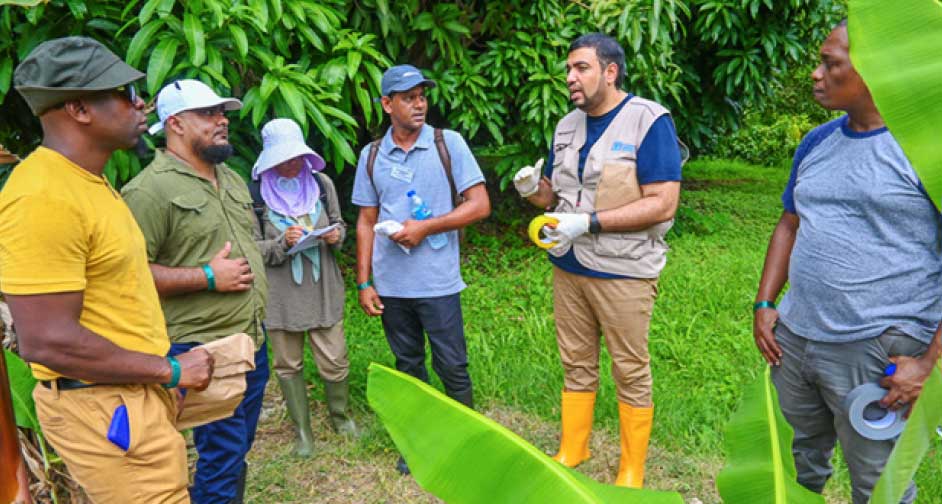
Regional farmers have successfully completed an intensive four-day workshop aimed at strengthening the Caribbean’s banana industry against the devastating Fusarium wilt.
This vital initiative, led by the Musa Technical Working Group of the Caribbean Plant Health Directors (CPHD) in collaboration with the Food and Agriculture Organization (FAO), the United States Department of Agriculture (USDA-APHIS), and the Caribbean Agricultural Health and Food Safety Agency (CAHFSA), with funding from the European Commission, has equipped farmers to combat the potential threat of Fusarium wilt, particularly the Tropical Race 4 (Foc TR4) strain.
Hosted in Saint Lucia, the workshop is part of a broader effort to enhance regional preparedness for Fusarium wilt through the innovative Farmer Field School (FFS) approach. Bananas are crucial to the economies of many Caribbean nations, providing essential income to smallholder farmers and significantly contributing to export revenues. However, the increasing threat posed by Fusarium wilt, especially the Tropical Race 4 (Foc TR4) strain, has raised alarms across the region.
Although the disease has not yet been reported in the Caribbean, its potential impact on banana production necessitates urgent action, particularly since the fungus can survive in the soil for decades, causing devastating losses to farmers. In his keynote address, Maged Elkahky, FAO’s plant pathologist, emphasized the importance of strengthening interregional collaboration to efficiently prevent and manage Foc TR4. “This training equips countries to conduct surveillance, monitor risks, and implement strict phytosanitary measures to prevent the introduction of the pathogen and contain it swiftly in case of an incursion,” Elkahky said.
The workshop had clear objectives:
• Enhance resilience in Caribbean banana production systems by preventing and preparing for Foc TR4 using a training of trainers (ToT) and FFS approach.
• Strengthen interregional collaboration for efficient Foc TR4 prevention and management.
• Increase awareness, policies, and strategies for more resilient banana production systems in the Caribbean region.
• Work with participants on drafting guidance for national contingency plans for Foc TR4 for Small Island Developing States (SIDS).
Participants from ten Caribbean countries engaged in intensive training sessions to bolster regional surveillance and response capabilities, focusing on prevention, early detection, and contingency planning.
Led by world-class experts in Musa diseases and pest management, including Luis Perez Vicente, Jaime Cadenas, and Monica Gallo, with technical support from Nelson Laville, Chairman of the CPHD, the workshop utilized the innovative Farmer Field School (FFS) approach. This method has equipped technical staff, extension workers, and other stakeholders with the knowledge and tools needed to address the serious threat of Foc TR4.
The Farmer Field School (FFS) is a group-based adult learning approach designed to teach farmers to experiment and solve problems independently. Known as “schools without walls,” the FFS approach allows farmers to meet regularly with facilitators to observe, ask questions, and learn collaboratively. Initially developed to teach integrated pest management (IPM) techniques in rice farming, FFS has since been adapted to various agricultural and non-agricultural activities, including organic farming and animal husbandry.
The workshop also delved into the latest research, best practices, and innovative solutions for combating Foc TR4. Lessons from this capacity-building exercise will be integrated into regional strategies for addressing other plant health threats, including Foc TR4.
As the Caribbean braces for the potential arrival of Foc TR4, this pioneering workshop marks a critical step in safeguarding the region’s banana industry and the livelihoods of countless farmers.




![Attendees at the UHC logo and website launch [Photo credit: GOSL]](https://thevoiceslu.com/wp-content/uploads/2026/02/Attendees-at-the-UHC-logo-and-website-launch-380x250.jpg)






![Remnants of an alleged drug boat blown up in a lethal strike by the U.S. military last week surfaced off Canouan on Saturday [Photo credit : St Vincent Times]](https://thevoiceslu.com/wp-content/uploads/2026/02/Remnants-of-an-alleged-drug-boat-blown-up-380x250.jpg)

